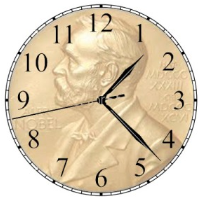Is Science Helped or Hurt by Huge Lag Time between Scientific Discovery and Awarding of Nobel Prizes?
 (graphic: Steve Straehley, AllGov)
(graphic: Steve Straehley, AllGov)
It is taking longer and longer these days for the Nobel committee to decide whom to honor for achievements in science.
At one time, the lag time between breakthroughs and Nobel prizes was shorter. One assessment published in Nature found those having to wait more than 20 years for their recognition occurred only 11% of the time in physics, 15% in chemistry and 24% in medicine prior to World War II.
But since 1985, such delays have happened in 60%, 52% and 45% of those awards, respectively, according to Santo Fortunato, associate professor of complex systems at Aalto University in Finland. As a result of this increasing delay, some scientists have died by the time their research was deemed worthy of honor. Since Nobel prizes are rarely given posthumously, some have missed out.
The Nobel committee tends to move slowly, as it sometimes takes decades to prove or refute scientific theories.
“We want to make sure that we award those who open the first door into new scientific insight. This means that naturally there is a delay,” Sven Lidin, the chairman of the Nobel Committee for Chemistry, told Agence France-Presse. “Typically it takes about 20 years before the initial door opener has matured into a Nobel Prize.”
The theory of “cold fusion,” which says controlled nuclear reactions can occur at room temperature, is an example in which waiting paid off. Two scientists announced in 1989 that cold fusion was possible. But other physicists have yet to reproduce the results 25 years later, leaving cold fusion still undeserving of Nobel attention.
The 2013 Nobel Prize in Physics for the discovery of the Higgs boson was awarded almost 50 years after the existence of the particle was first theorized. The particle’s existence was confirmed in 2012. François Englert and Peter Higgs each claimed half the award, but co-discoverer Robert Brout missed out on becoming a Nobel Laureate. He’d died in 2011.
One researcher suggested that there be other prizes for younger recipients, honoring more recent efforts, which could encourage other scientists. “In order to promote and reward innovation and creativity, it would indeed be more useful to have prizes that reward more junior researchers and that reward more recent discoveries,” Matthew Wallace of the Institute for Innovation and Knowledge Management of the Spanish National Research Council said.
-Noel Brinkerhoff, Steve Straehley
To Learn More:
Scientists Sound Alarm over Waiting Decades to Receive Nobel Prize (Agence France-Press)
The Nobel Prize Delay (Physics Today)
Professor Notes Wait for Nobel Science Prizes is Growing Alarming Long (by Bob Yirka, Phys.org)
- Top Stories
- Unusual News
- Where is the Money Going?
- Controversies
- U.S. and the World
- Appointments and Resignations
- Latest News
- Musk and Trump Fire Members of Congress
- Trump Calls for Violent Street Demonstrations Against Himself
- Trump Changes Name of Republican Party
- The 2024 Election By the Numbers
- Bashar al-Assad—The Fall of a Rabid AntiSemite






Comments